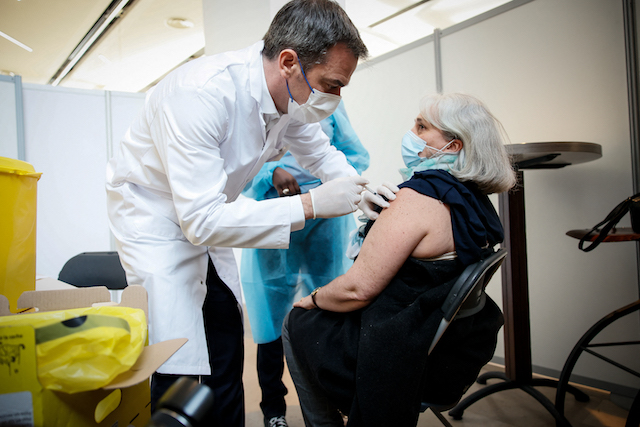President Emmanuel Macron announced the milestone in a tweet that said “20 million” with a green checkmark, a number that represents around 30 percent of the population.
20 millions : ✅ pic.twitter.com/tYQOdM4TPY
— Emmanuel Macron (@EmmanuelMacron) May 15, 2021
Health officials said the exact figure was 20,086,792; with 8,805,345
people having also had a second vaccine dose.
“It’s a very important moment for the entire country, because it supports our prospects for ending this crisis,” Prime Minister Jean Castex told journalists while visiting the mass vaccination site at the Porte de Versailles conference centre in Paris.
READ ALSO: UPDATED: When will you be eligible for the Covid vaccine in France?
The government aims to have 30 million initial doses injected by June 15th, when President Emmanuel Macron has said all adults will be able to sign up for a jab currently reserved for priority groups and adults over 50.
The vaccination campaign in France is picking up pace as it’s been extended to all over-18s, who can now book a Covid-19 vaccination. That is as long as they can find a vacant slot within the next 24 hours.
“It’s within reach,” Castex said. Authorities also reported further declines in the number of patients requiring intensive care in hospitals.
The number of people in intensive care continued to fall Saturday, with the latest figures showing fewer than 4,271 – down from 4,352 the previous day.
That is well below the peak of 6,001 during the “third wave” of infections that battered France starting in March.
On Wednesday, museums, theatres, cinemas and concert halls will reopen with limited capacity after six weeks of closure to halt the pandemic, and the nationwide curfew will be pushed back to 9pm from 7pm.
READ ALSO: Covid-19: Will it be safe to return to France’s cafe terraces?
Non-essential shops will also reopen and outdoor seating at cafes and restaurants will be allowed for the first time since October 30th.
Cafes and restaurants will be able to serve clients indoors on June 9th, and the curfew will be fully lifted on June 30th if infection rates continue to decline.
By this date, the limits on establishments receiving public – such as restaurants, bars, cinemas and museums – might disappear, depending on the local health situation.
The government has previously said it favours following local guidelines, allowing for more activities in areas with a lower spread of infection.



 Please whitelist us to continue reading.
Please whitelist us to continue reading.
Member comments